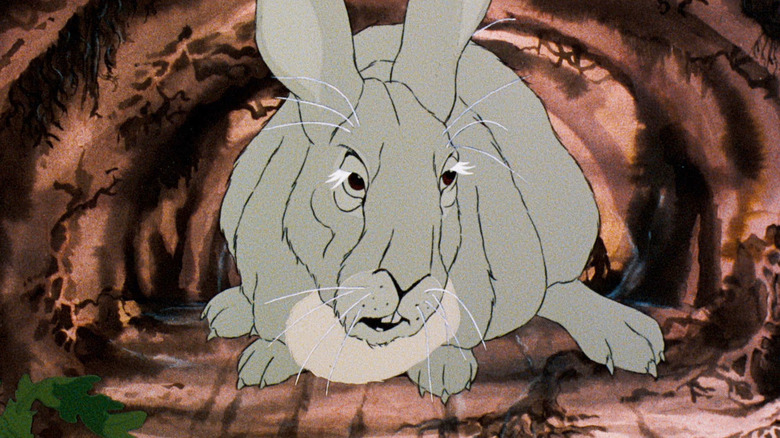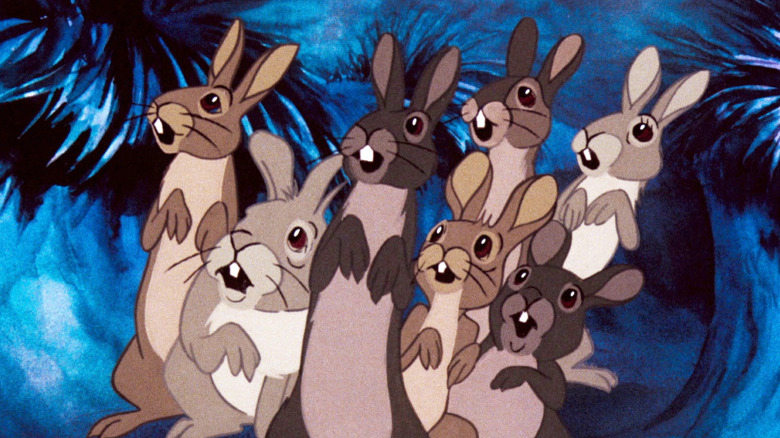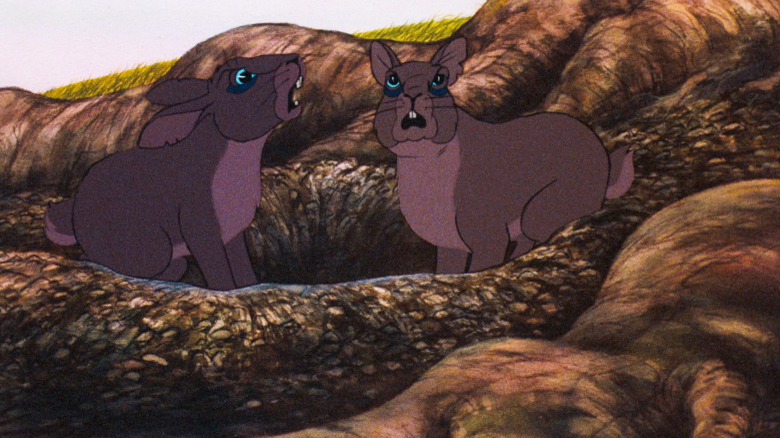The Daily Stream: Watership Down Is The Most Intense Movie About Cartoon Rabbits You Will Ever See
(Welcome to The Daily Stream, an ongoing series in which the /Film team shares what they've been watching, why it's worth checking out, and where you can stream it.)
The Movie: "Watership Down" (1978)
Where You Can Stream It: HBO Max
The Pitch: A young rabbit named Fiver (voiced by Richard Briers) has a vision of impending doom for the rabbit-warren where he resides, the forest near their home running red with blood. Aware his sibling's visions have come true in the past, Fiver's brother Hazel (John Hurt) chooses to defy the orders of his chief, who forbids anyone from leaving their burrow. Leading a group that includes Fiver and several other rabbits, Hazel and his peers brave hawks, cars, human traps, dogs, cats, and tyrannical rabbits known as Efrafans in the hopes of finding a new safe haven at the hill Fiver sees in his mind: Watership Down.
As filmgoers soon came to learn upon its release in 1978, director Martin Rosen's "Watership Down" (itself adapted from the 1972 novel of the same name by Richard Adams) is far from a casual romp through the woods with a band of merry cartoon rabbits. Along with Ralph Bakshi's "The Lord of the Rings" — which arrived in theaters the same year — Rosen's movie blazed a trail for animated features to come, showing how the medium could be used to bring mature stories with layers of meaning to life with a primal and even savage edge.
Why it's essential viewing
Unlike Disney's "Bambi" and the works of Don Bluth, "Watership Down" makes no effort to soften the brutal side of nature, much less humanity's wanton disregard for other living beings. ("Men have always hated us," a rabbit says at one point. "No — they just destroyed the warren because we were in their way," another replies.) The many animals in the movie still posses an element of stylization yet are otherwise realistic in their features, with distinctly inhuman facial expressions and physical builds. At certain points, however, Rosen and his animators forgo realism entirely in favor of abstraction, allowing them the depict the horrors of rabbits being killed by predators or buried alive in their burrows in a manner that's disturbing and nightmarish without being overtly graphic.
Another thing that sets "Watership Down" apart from similar animated movies is that it doesn't fully anthropomorphize its heroes. In its pleasingly stylized prologue, the creation myth imagined by the film's rabbits is recounted through moving hieroglyphs, yet it never explicitly parallels that of any human religion or mythology. Nor, for that matter, do the rabbits or any other creatures come to see the world in the way a person would when it concerns their grasp of logic, gender, or even the laws of physics. Instead, "Watership Down" comes closer than probably any other movie to properly imagining what it might be like to actually exist as an animal in our confusing reality.
A hero's journey for kids
At its core, "Watership Down" is a simple hero's journey story that follows Fiver, Hazel, and their kin on a somewhat episodic adventure in the vein of "The Odyssey." Don't let that fool you, though. The film has a lot on its mind, from its frank depiction of the circle of life to its themes about the destruction of nature, the need for alliances in the face of hardships, and the never-ending battle for freedom to win out over oppression (even from within the ranks of one's "tribe"). Its voice cast takes their characters as seriously as their struggles, with the likes of John Hurt, Michael Graham Cox, and Harry Andrews bringing a rich sense of gravitas to their roles as floppy-earned critters of dramatically different dispositions and tempers.
Is "Watership Down" too traumatizing and intense for kids? It's an issue that remains open to debate, even now that generations of people have grown up watching the movie at a young age only to draw inspiration from it for their own output as filmmakers years later. As I see it, though, "Watership Down" is better for children than a lot of so-called "kids films." Its violent imagery is shocking and upsetting, but it's always purposeful and never so distressing as to be completely overwhelming. The movie also speaks to the value of friendship, trust, and courage in a fashion that's meaningful for people of all ages.
Of course, when push comes to shove, it's up to parents to decide if and when their kids are ready to check out "Watership Down." For everyone else, it's a must-see that proves the still-pervading belief that animated films are strictly for children should've faded away a long time ago.


